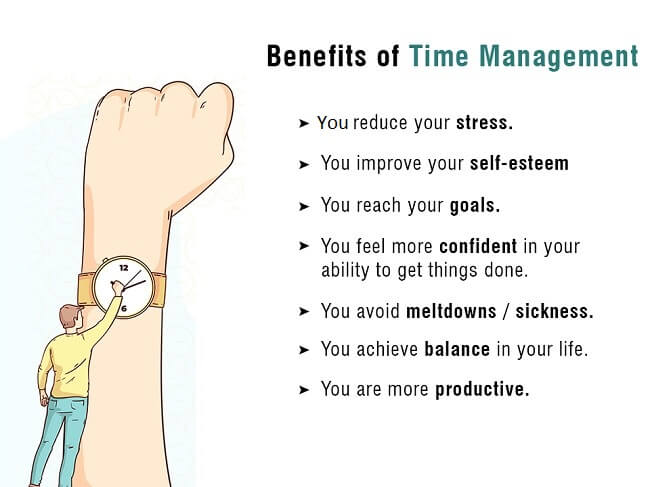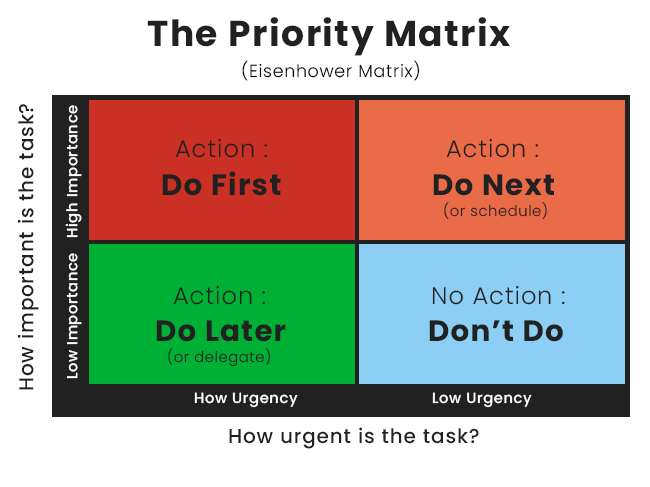Time Management EssayAre you running out of time? Are you wasting your time? Do you feel like you cannot use your time to yield maximum output? The word 'Time' might seem like a simple four-letter minuscule word, but it is something more complex and complicated than it seems. The average human life expectancy is around 72 years, according to UNITED NATIONS, 72 years is an insignificantly small number, so it is important for us to acknowledge that time management is very predominant. Time is something of incalculable worth, it is like a precious gift to us. 
What Exactly is Time Management?It is organizing and arranging your work and sleep to save maximum time. Time management helps increase efficiency, productivity, work rate, and capacity. Every person on this earth gets the same amount of time which is 24 hours a day, but how come everyone, is not productive? The simple answer is Time management. All the high flyers have one thing in common: they manage their time exceptionally well. Every single person on this earth has the potential to manage their time and yield the maximal output out of a day. Time is minimal, and someone appositely said: "Time and Tide wait for none." Time management skills are not only used by individuals but also by MULTINATIONAL COMPANIES. It plays a foremost character not only in professional but also in personal life. Benefits of Time Management
1. Time Management Makes a Person Organized People prefer to keep their workplaces and study zones organized, neat, and clean for good time management. People learn to be more arranged and organized due to time management. 2. It Makes a Person More Expeditious To make sufficient use of time, people try to be more effective and expeditious, individuals make a 'TO-DO' list at the beginning of the day in a sequence of their importance. This type of plan gives individuals a sense of direction throughout the day. 3. It Boosts the Confidence of a Person As a result of time management, individuals complete the task within minimal time, which gives them more confidence to move forward in life and achieve their goals. When a person completes their work in a stipulated time frame is looked up to by others and is always the focal point of attraction everywhere. 4. Time Management Can Make People Prosperous and Successful Time management can take us to the pinnacle of success and give us wealth. Better time management results in effective work, which in turn gives us recognition and respect at our workplace. 5. Time Management is a Stress Reliever It is always seen that pending work increases our stress and anxiety, but by using time management skills, we can complete our work quickly and eliminate stress or anxiety in our professional or personal life. Time management helps us to map out our ambition in life. Time Management Skills
1. TO-DO ListIt is one of the most influential and productive skills. We should jot down the necessary work during the inception of a day in a sequence of their urgency and then try to complete each work in that list. 2. PrioritiseA person must know what work to prioritize first. High-priority work must be written on the top of the 'TO-DO' list, followed by the less important work. One should set goals and prioritize them. Further, these goals should be broken down into smaller tasks because it is easy to assign priority to individual tasks, we may also set deadlines for them which will make it easier to prioritize them. Various methods are followed to prioritize:

3. Set Achievable TargetsWe should set a realistic target, each person knows his capability and capacity, and one should not overburden themself, as it can result in stress and dwindle our productivity. 4. Set a TimerOne should inculcate the habit of setting a timer for a more efficacious and fruitful day to keep track of time. It helps to enhance our productivity by being more concentrated and completing a task within the given time frame. 
5. Do Include Time for Leisure ActivitiesMany studies show that working for too long makes our brain stagnate; however, taking frequent breaks during work time becomes more productive and effective. During these breaks, we should socialize more, perform physical activity, and attend personal calls. 6. Elimination of Non-PrioritiesTo complete our tasks more efficiently, along with hard work, one should also focus on smart work, which can be done by eliminating things that are not a priority and can be dropped. Many people waste their time on unimportant things, which is a bad idea. We all know living in a cocoon is way easier than facing the real world; everybody loves to be in their safe zone, which makes it impossible to eliminate the things which are not necessary. To do this, one should divide their tasks into different groups. Learn about different methods which help in increasing our productivity. Consequences of Poor Time ManagementPoor time management can make a person inefficient, unproductive, and uncompetitive. Some of the consequences of Poor Time Management include:
Poor Time Management degrades the quality of work. Due to a lack of time management, people tend to finish their work at the last moment, which makes their quality of work low, degraded, and unsatisfactory.
Improper Time Management leads to the wastage of time. Time is limited in quantity, and it has to be used judiciously. People tend to waste their time on inconsequential work with little relevance, value addition, and impact on their lives.
The inability to craft an organized plan and pursue objectives relentlessly indicates poor efficiency of the person. Suppose you have been provided large and significant works within a limited period. You need to devise a plan for effectively completing the work. Suppose you begin the work unplanned; you land back and forth, revisit things, and backtrack. This will reflect your inefficiency and poor productivity.
Inefficient time management will entail a loss of command from your work. It will distract, lower your work, and could affect your deadline. Proper time management helps get command of the work, and the work gets completed on the deadline. Suppose you are doing school homework but are simultaneously surfing social media and chatting with friends. This will distract you and waste your time.
If the person cannot do work in the allotted time frame, he will become unreliable and will bring shame to his personality. Corporations prefer persons with Reputation, reliability, and credibility. Their reliability and Reputation get affected if the person cannot complete the mission on the given deadline. Cultural Views on Time ManagementDue to the differences in culture of different countries, their definition of time is different, too, as are their time management skills. If you take the example of America with most Northern European countries such as Germany, Switzerland end England, they follow the linear perception of time, which means conceiving time as flowing from one moment to the next linearly. These cultures avoid wasting their time and significantly value productive time management. Linear perception of time correlates with being more "monochronic," which means doing one thing simultaneously. In general, if we follow these ideologies, it will help us to maintain more focus for a longer duration, which will lead to productive time management. Other than this, another culture follows a "polychronic" or multi-active time view which means doing multiple things simultaneously; most southern European countries like Spain, Portugal, and Italy follow these ideas. The primary purpose of following this is it brings happiness as you can complete more tasks in less time. These countries believe in synergy; they choose creativity over efficiency. 
The last kind of culture is the "cyclical view" of time. In these types of cultures, time is neither considered linear nor related. As we all know, days, months, years, and different environmental seasons cyclically take place, i.e., they keep repeating themselves regularly like a cycle. In these types of cultures, time is not wasted because it will always come back later; hence, they think they have unlimited time. These theories can be found in Asian countries like Japan, China, etc. They take time before actually doing the work; they think about the decisions and their impact before implementing them. ConclusionThe world has become competitive, ruthless, and diverse. Every minute counts, and time management's importance gets enhanced with each passing day. People cannot afford to waste their time on inconsequential activities; instead, they must use it judiciously. People are expected to prioritize their work based on their importance and urgency, formulate a plan and devote sufficient time to finish the work on time. People who have become successful have repeatedly stressed efficient time management. This concept is crucial for young people because expectations are high, and they must sail smoothly through the challenge. People should remember Mark Twain's lines, "If it's your job to eat a frog, it's best to do it first thing in the morning. And if it's your job to eat two frogs, it's best to eat the BIGGEST one first".
Next TopicChildren's Day Essay
|
 For Videos Join Our Youtube Channel: Join Now
For Videos Join Our Youtube Channel: Join Now
Feedback
- Send your Feedback to [email protected]
Help Others, Please Share









